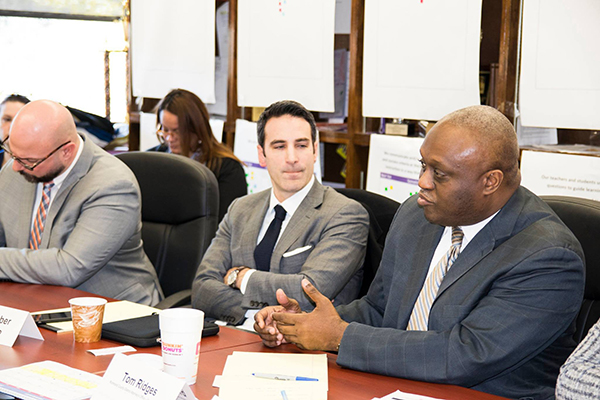News and Events
At HeartShare, we believe in keeping you aware of news and events throughout the agency. Be sure to visit our Events Calendar for important upcoming dates that may be of interest to you.
HeartShare St. Vincent’s Hosts Chemical Dependency Roundtable To Foster Cross-Sector Collaboration in Addiction Services
February 23, 2017
HSVS, In The Media

At the HeartShare St. Vincent’s Services (HSVS) Chemical Dependency Roundtable on Friday, February 17, 2017, Tom Ridges, Special Counsel to Staten Island District Attorney Michael McMahon, stressed the need for preventive solutions, not treating addiction after an arrest has been made. Councilmembers Joseph Borelli, Steven Matteo, and Debi Rose, as well as Staten Island Borough President James Oddo were represented at the event.
HeartShare St. Vincent’s Services (HSVS) hosted a Chemical Dependency Roundtable event at Tottenville High School on Friday, February 17 to discuss and find intersectional solutions to rampant drug use and overdose incidences on Staten Island.
“HeartShare St. Vincent’s Services is here to learn more about your greatest struggles when it comes to chemical dependency and how we can more effectively deliver services to your communities,” said HSVS Executive Director Dawn Saffayeh, who opened the discussion to Staten Island elected officials, non-profit leaders, educators and other community partners. HSVS has three Chemical Dependency Clinics in Brooklyn, Queens and Staten Island. The Staten Island clinic is located at 56 Bay Street, 1st Floor.
Several issues arose during the discussion, including the lack of cross-sector collaboration, the lack of preventive treatment options, as well as easy accessibility to drugs across the Island. “This problem knows no race, age or economic status,” noted Lisa Candella, Assistant Commissioner of Staten Island Adult and Juvenile Operations, NYC Department of Probation.
First, government agencies and stakeholders are facing the same problem on the Island, but are not coming up with intersectional solutions. Olivia Dana, Project Director at Staten Island Youth Justice Center, suggested that there needs to be more of a bridge between the authorities and those struggling with addiction. “Our kids need to see police departments and elected officials as members of the community trying to help,” Dana explained. Jennifer Sammartino, Director of Communications and External Affairs for the Staten Island Borough President, mentioned James Oddo’s “Too Good for Drugs” initiative, which builds a sense of community when police officers teach in fifth grade classrooms across the borough.
Secondly, the roundtable discussion tackled how repeat overdose cases would benefit from more aggressive preventive treatment. Tom Ridges, Special Counsel to Staten Island District Attorney Michael McMahon, spoke about the importance of drug treatment, which typically only happens pre-arraignment. Councilmember Steven Matteo agreed that most Staten Island residents are arrested, then treated. Unfortunately, most providers don’t want to take on those patients, who are very complex. Additionally, Councilmember Joseph Borelli suggested that parents are often too embarrassed to come forward. David Hernandez, Director of Constituent Services for Councilmember Debi Rose, also addressed the stigma surrounding treatment.
In response, Dawn Saffayeh asked the group about the viability of home or school based services. Educators at Tottenville High School including Principal Joseph Scarmato and Assistant Principal of Guidance Stacie Watkins stressed that reporting families to Administration for Children’s Services (ACS) is a last resort and instead, would like to provide much-needed counseling and treatment to students on-site at the school. “HeartShare St. Vincent’s Services wants to work with and bridge connections with existing providers. We don’t want to reinvent the wheel,” explained Jennifer Outlaw, Senior Vice President of HSVS Integrated Health Services, which is a “one stop shop” to patients in need of chemical dependency and mental health services, which are co-located at each HSVS clinic.
Lastly, the group discussed the easy accessibility to drugs across the Island. Dr. Ginny Mantello, MD, James Oddo’s Director of Health and Wellness, reported that Staten Island has the highest number of unintentional overdose deaths in the City. “Pharmacies pushed opioids and medical practitioners were misinformed about the addictive nature of those drugs, which are now plentiful in homes,” explained Dr. Mantello. Senior Nurse Kathleen Rainero of the Visiting Nurse Association of Staten Island shared a personal anecdote about how she received a prescription for chronic pain, but instead turned to physical therapy. “Whether it’s emotional or physical, people need to know that there are other options to manage pain,” Rainero said.
The 90-minute discussion laid the foundation for future action. “As Staten Island continues to grapple with the heroin and opioid epidemic plaguing our borough, we applaud HeartShare St. Vincent’s Services and look forward to a continued partnership with organizations dedicated to helping those battling addiction,” said District Attorney Michael McMahon. “HeartShare St. Vincent’s provided us with an opportunity to discuss how local treatment providers can better meet the needs of those battling an addiction to opioids and other substances,” added Councilmember Debi Rose.
Others in attendance included Darren Albanese, Executive Director of the New York City Family Justice Center, Lisa Lindsay, Citywide Problem-Solving Court Coordinator of Drug Treatment Court, Andrew DeRose, Deputy Director of Staten Island Administration for Children’s Services, Andaya De La Cruz, Senior Youth Development Coordinator of the Department of Education, and Morgan Mazzarella, Community Liaison Officer for the Staten Island District Attorney.
HeartShare St. Vincent’s Services aims to reconvene the group, with additional community partners, in about six months to discuss progress and move this collaborative solution-based model forward. If you are interested in partnering with HeartShare St. Vincent’s Services to bring chemical dependency treatment to a specific community in Brooklyn, Queens or Staten Island, please feel free to reach out to Jennifer.Outlaw@heartshare.org for further discussion.
More photos from the event may be found on the HSVS Facebook page.
Share
Website Footer
 Donate
Donate
Sign up for our newsletter

Click this logo to support HeartShare every time you shop at Amazon. For all eligible purchases, the AmazonSmile program donates 0.5 percent of the price to HeartShare.
Website by Manoverboard Inc.

